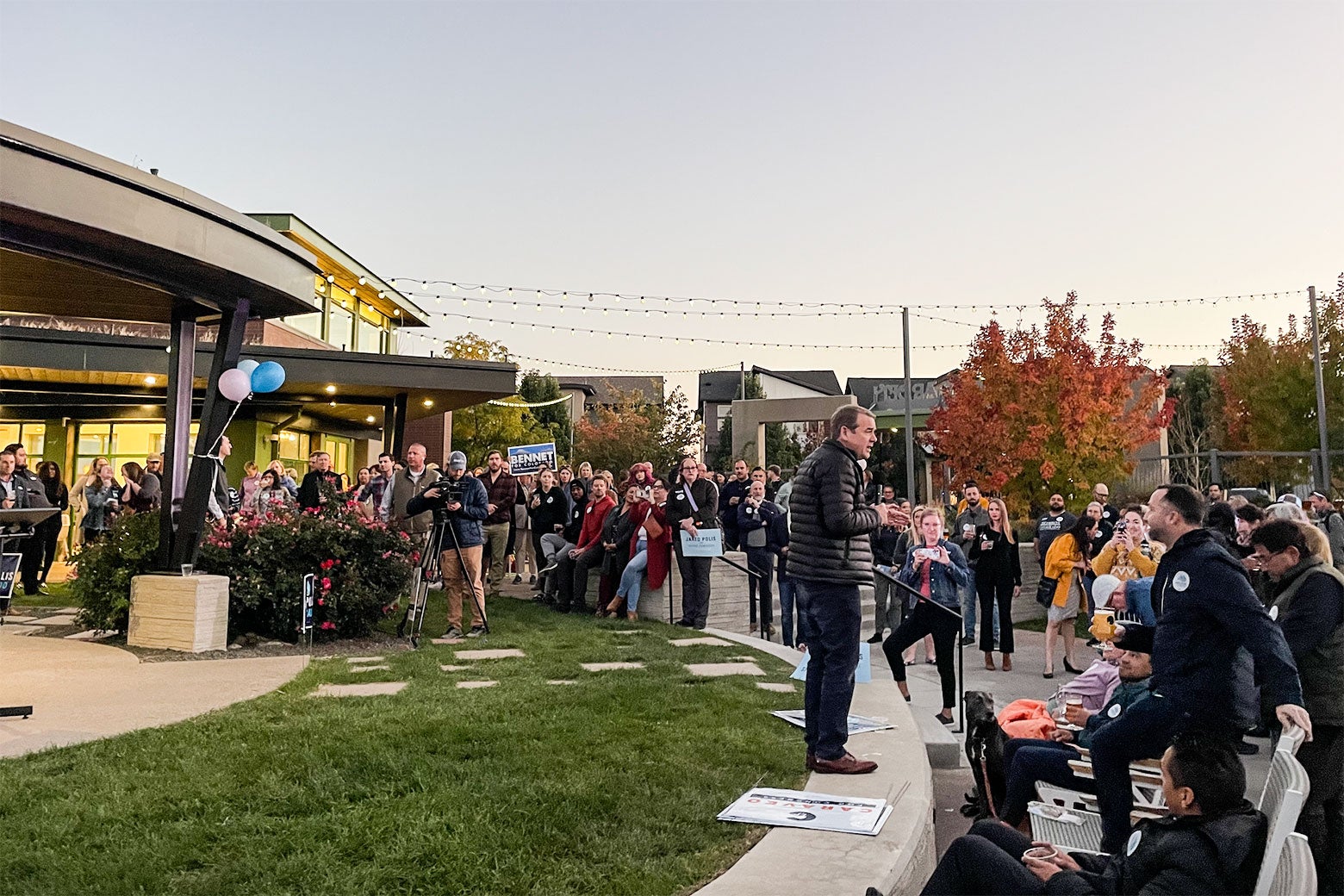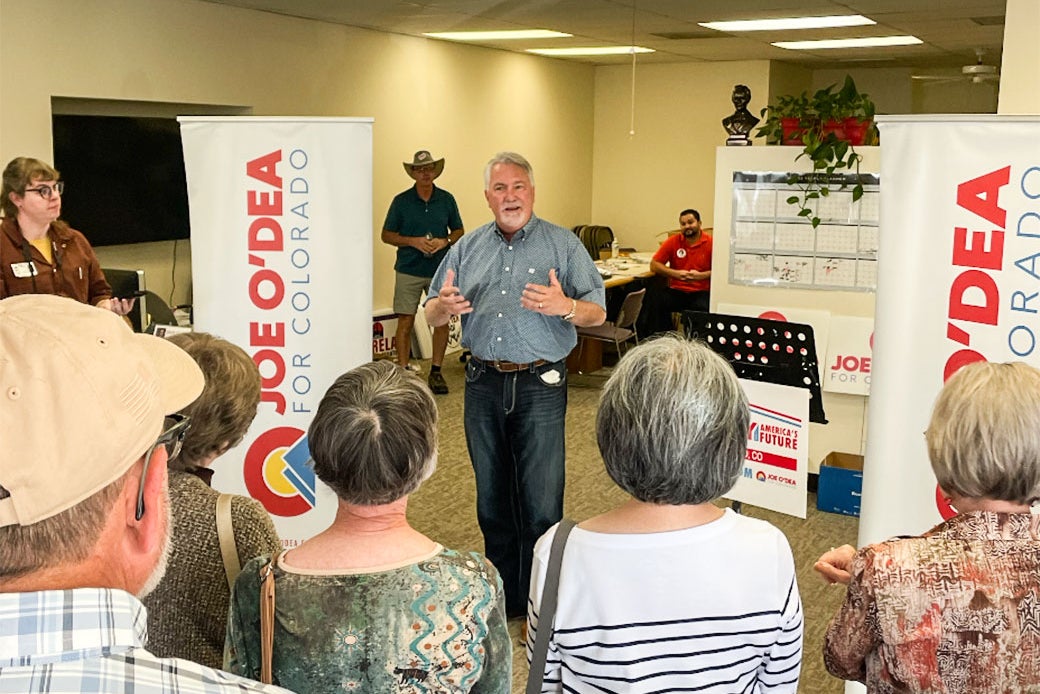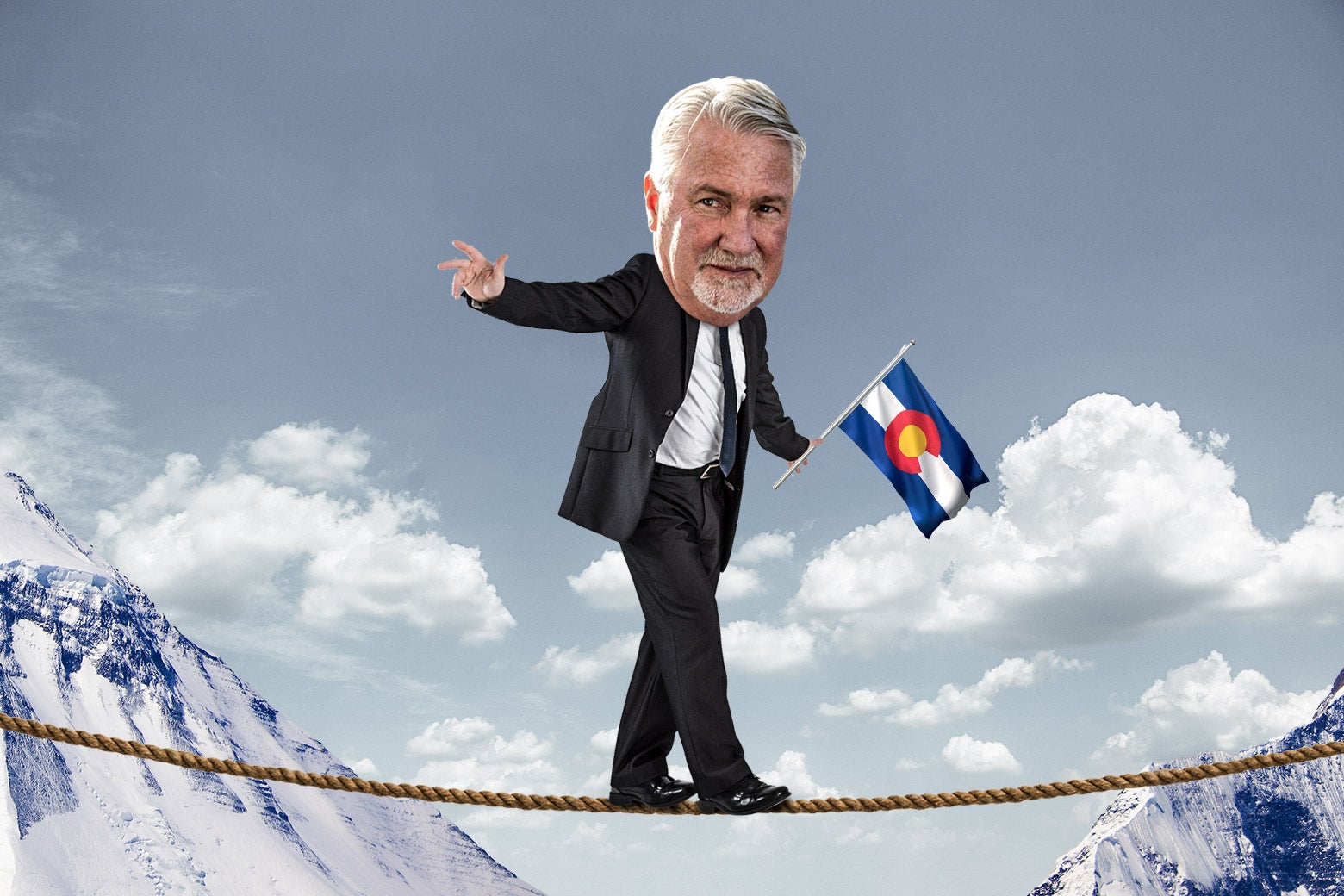On Oct. 17, just a few weeks before the midterm elections, Donald Trump called one of Republicans’ most fawned-over Senate candidates “stupid.”
Took him long enough.
“There’s this RINO character in the Great State of Colorado, Joe O’Dea, that is running against the incumbent Democrat for the United States Senate, who is having a good old time saying that he wants to ‘distance’ himself from President Trump, and other slightly nasty things,” Trump wrote on his bespoke social media site. “MAGA doesn’t Vote for stupid people with big mouths. Good luck Joe!”
It’s a complicated badge of honor for a Republican trying to run as a moderate in a blue state in 2022.
A purplish state under Barack Obama, Colorado has in the past decade seen a population boom twice the national rate, full of college-educated professionals, Hispanic voters, and California émigrés. The Trump effect starkly accelerated Colorado’s transition into bluer territory: Hillary Clinton won the state by 5 points in 2016—then Joe Biden won it by 13 in 2020. Republicans nevertheless harbor hope that Colorado could be winnable for them in a bad year for Democrats, and with the right candidate. They felt they had both with Joe O’Dea in 2022.
O’Dea’s effort to navigate that slim path to victory, though, has been a case study in what it’s like to get hammered from both the right and the left, and to have to choose every word with the utmost delicacy. He would have had zero path to victory without building a wall between himself and Trump. (He attempted to do so on Oct. 16 by saying he would “actively campaign against Donald Trump” should Trump seek the presidency again, prompting the right-on-cue Trump meltdown.)
But that kind of talk only dampens enthusiasm among the state’s MAGA voters, and O’Dea needs every last one of their votes. And just because O’Dea has attempted to distance himself from Trump, or said he supports the right to an abortion in the “first five months” of pregnancy, it doesn’t mean his Democratic opponent, Sen. Michael Bennet, is going to let him off the hook.
Such is the predicament of the rare modern-day Republican trying to play to the middle.
Big Primary Energy
Joe O’Dea has earned national attention as a star candidate for Senate Republicans this cycle. Some of that is on him. But some of it is just the process of elimination.
O’Dea, a wealthy owner of a construction company and first-time candidate, is running a precise, textbook campaign for a Republican in unfriendly territory: hammering messages about inflation, crime, and the border—the issues where Democrats poll most poorly—while trying to inoculate himself on lightning-rod issues like abortion, same-sex marriage, and protections for Dreamers by adopting more moderate stances. And, of course, by keeping Trump, for whom he twice voted, at more than arm’s length.
Trump himself may not be a fan. But O’Dea has won the affections of the rest of the party, ranging from MAGA-friendly Florida Gov. Ron DeSantis to MAGA-unfriendly George W. Bush. He has been treated as something of a unicorn in an otherwise messy year for GOP Senate candidates: While voters in far more winnable states like Georgia, Arizona, and Pennsylvania have, with Trump’s help, nominated individuals laden with baggage who went off the deep end in their primaries, Colorado Republicans nominated their most “electable” candidate in O’Dea.
If it were up to Mitch McConnell, they’d all be like this, and his life would be a lot easier. McConnell called O’Dea the “perfect candidate” for Colorado at a July event and pledged that national Republicans would be “all-in in Colorado.” Democrats didn’t want to face O’Dea either and spent millions of dollars in the Republican primary trying to prop up O’Dea’s more right-wing opponent, Ron Hanks.
Hanks lost. And he’s still not over it.
“Frankly, Jim, I characterize [O’Dea] as a liar, as a coward, and as an individual with no political convictions,” Hanks told me in an Oct. 20 interview. “He’s a pay-to-play opportunist, and he feels like a safety valve for the left wing.”
An Air Force veteran from Cañon City, Hanks was elected to the Colorado legislature in 2020, marched to the Capitol on Jan. 6 (though says he did not enter), and believes “abortion is murder. Period.” But the best way to describe his primary branding is this: His campaign launch video showed him shooting and blowing up what appeared to be a photocopier, labeled “DOMINION VOTING MACHINE,” with a large-caliber rifle.
“Rep. Hanks is a single-issue candidate,” O’Dea joked in a primary debate. “He is running to blow up voting machines.”
Hanks only raised about $165,000 for his own campaign. But the Senate Democrats’ top super PAC pumped more than $4 million into efforts to elevate his candidacy in the primary, seeing him as a much more beatable opponent than O’Dea. One ad “criticized” Hanks ahead of the primary as “one of the most conservative members of the State House.” (Message to GOP primary voters: one of us!) The other ad essentially bear-hugged O’Dea, citing previous donations he had made to Democrats and his support for Biden’s bipartisan infrastructure bill. (This latter tactic has complicated Democrats’ post-primary efforts to label O’Dea as yet another out-of-step, right-wing, Trump-loving extremist who can’t be trusted.)
O’Dea won the primary, 54 to 45 percent—an uncomfortably close margin against a candidate who leaders of both parties felt was unelectable.
But that wasn’t the end of that. Even after the most bruising of primaries, defeated opponents typically throw their support behind the victor, stressing the importance of taking back the seat and the Senate majority.
Ron Hanks wouldn’t play ball.
“The public is taking a grave risk were they to vote for him,” Hanks said of O’Dea in our interview. “They have no knowledge who this guy is. And you won’t know unless you go to three or four of his political events, because he’ll change what he says depending on who he’s speaking to. He has no convictions.”
Hanks, instead, threw his support behind Brian Peotter, the Libertarian Party candidate in the race. Then, about a week later, Trump launched his attack on O’Dea.
So when I spoke with Peotter the day after Trump’s nastygram, he was flying high, if a little overwhelmed.
“It’s been one of the best weeks ever,” he told me. “I’ve had over 100 requests for yard signs come in over the last 24 hours, which I don’t have a way to distribute effectively across the entire state.”
In our chat, he thankfully did not try to pretend that he had a path to victory. He was blunt about his purpose in the race.
“I am intentionally trying to be a spoiler to make a point,” he said.
The point?
“That the Republican Party can’t moderate to the center to win, because they will be taken out from the right,” he said.
Peotter described himself to me as a “libertarian on almost every issue,” but, “as a Christian, I am also very pro-life, and I’m the only pro-life option on the ballot.”
“You can’t campaign against family values and expect to hold on to the conservatives in your state,” he said. “So when they argue they should moderate to the center because that’s the only way to win, I want to show them that the Libertarian Party will take their base from them.”
Brian Peotter will not take the conservative base from Joe O’Dea. But he could take some of them, which could matter a great deal if the race winds up close. There could be some who can’t stomach O’Dea’s campaigning as a “pro-choice” Republican, or who are turned off by his feuding with Trump. O’Dea may have deemed these tactics necessary to have a chance in Colorado. But plenty of MAGA voters will be holding their noses in the voting booth.
I asked Peotter whether he’d heard anything from Trump’s camp or had reached out to him. He hadn’t, but he asked that I pass along Trump’s phone number if I came across it, “so I can text him, ‘thank you.’ ”
Pint Glasses, Patagonia, and Remote-Working Professionals
“So are you doing the ‘this race is going to be closer than you think’ story too?” A Colorado politics reporter asked me my first night in Denver.
I was not the first national reporter to do a “fly-in” from D.C. to see Mitch McConnell’s “perfect candidate.” We were becoming tiresome. Perhaps all the more so because Bennet had been maintaining a roughly 10-point advantage on O’Dea in polling averages. Sometimes they’re “sleeper races” for a reason. (“I’m doing something post-that,” I said, stupidly.)
That night, we were seeing O’Dea’s target, the incumbent Michael Bennet, at a Democratic kickoff rally ahead of a statewide bus tour.
The event was held at a common setting in contemporary, growing, expensive Denver: a brewery that looked like it was built about three days prior, amid a sprawl of condo developments built three days prior to that. Pint glasses, Patagonia outerwear, sandals that would make for poor footwear as soon as the sun went down and the temperature dropped 20 degrees, music, young children. This was the Denver that remote-working professionals moved to during the pandemic for better access to the outdoors.

The central motivating factor among the Democrats I spoke to at the event was that they didn’t want to see Republicans back in charge. Democracy, attendee after attendee said, was at stake. (Bennet’s bus driver, meanwhile, told me he was most concerned about gas prices.)
But what gets them jazzed for Michael Bennet?
…
… ?
“We’re fine with Michael Bennet,” a woman named Virginia, there with her sister Martha, told me.
Bennet, a member of the Senate since 2009, has had his successes inside the Capitol. But he’s not the kind of politician people hang posters of on their walls. He overtly campaigned in his short-lived 2020 presidential campaign on being boring.
“It’s hard to say people have any consistent opinion about Bennet,” Ryan Falor, of Denver, told me at the rally. “It’s kind of like, ‘He’s the Democrat.’ He doesn’t have as much of a public persona for people who are not very aware of politics.” This is in marked contrast to John Hickenlooper, the other senator from Colorado, “who has a very strong public presence and people have a better picture of,” Falor said. Bennet is a “subtler” taste.
There was nothing subtle about Bennet’s four minutes of speaking at the rally. He told attendees at the brewery, located in the state’s brand new 8th Congressional District, that they were at “ground zero for this election” to prevent a “pro-life majority in the House of Representatives.” He said, further, that since Jan. 6, his “conclusion is that every election between now and when we expire is the most important election of our lifetime, and we have to treat it that way.”
Bennet didn’t mention O’Dea in his speech. But in an interview after the event, when I asked him about Trump’s lashing of “RINO” O’Dea earlier that afternoon, he jumped into a list of talking points about how O’Dea was no moderate at all, especially when it comes to abortion.
Colorado has a particularly long history of abortion rights, becoming the first state in the nation to liberalize its abortion laws in 1967. It comfortably rejected a 2020 ballot measure to ban abortion after 22 weeks (without exceptions for rape, incest, or a fatal fetal diagnosis). And earlier this year, ahead of the Dobbs decision, the state government passed a law enshrining the right to an abortion without restrictions.
O’Dea has tried so hard to prove his bona fides on this issue that he has his daughter swearing up and down in campaign ads that her dad supports abortion rights.
But even if O’Dea were personally performing abortions, for free, on the steps of the Supreme Court, Democrats would find a way to put him on the wrong side of their strongest issue. And Democrats found an opening by discovering that O’Dea supported the 2020 ballot measure banning abortion after 22 weeks with very limited exceptions, telling the Associated Press that he “didn’t look at all the nuances” when supporting it. Not only did he vote for it, he signed a petition—with the language and all the “nuances” spelled out—to get the question on the ballot.
That, along with O’Dea saying that he would have voted to confirm the deciding justices on the Dobbs decision, is enough to backstop millions of dollars of ads—and perhaps a Senate seat—in a state like Colorado, post-Dobbs. In 2014, a similar focus on abortion and the “war on women” earned Sen. Mark Udall the mocking moniker “Mark Uterus” on the campaign trail in his losing campaign to Cory Gardner. That was just two years, though, after Obama had only carried the state by 5 points. And the Supreme Court hadn’t literally just overturned Roe v. Wade.
Pressing the Flesh
I finally got to see Mr. Perfect, Joe O’Dea himself, on the afternoon of Oct. 20, after days of hearing haters from the left and the right batter the guy.
O’Dea spoke at a rally at the offices of the Pueblo County Republican Party on a Thursday afternoon, in front of about two dozen attendees and volunteers who had showed up for pizza and a pep talk. There was a merch table of safe, campaign-branded O’Dea attire, but some of the attendees had worn their own flair. One man approximating the look of Santa Claus, who briefly asked questions of myself and another reporter about media bias, was wearing a faux MAGA hat that read “Make Europe Warm Again.” He had it made just for himself, he said proudly. There was a clever “Defund the Polis” shirt, a reference to the state’s incumbent Democratic governor, Jared Polis, who is on track to win reelection.
O’Dea kept it brief. Wearing boots, jeans, and a short-sleeved button-down, he spoke to the assembled briefly about his backstory: how he got a “little bit of discipline” in Catholic school, started out in carpentry, worked on a construction management degree, and now manages 300 employees through his Denver-based company. He then hit on the “tax and spend spree” that Bennet and Biden have been on, “flooding the market with money” and sending inflation soaring. He cited stats showing crime rising in Colorado, with car thefts especially on the rise. Overdoses were rising, too, he said, and we needed to “close this border down and get this fentanyl thing under control.”

Inflation, crime, the border. One, two, three. Then, a softener: He said he would get the “DACA kids their citizenship” as part of an overall immigration reform bill, which he would introduce immediately and believed he could get 60 Senate votes on.
After a tight four minutes, O’Dea was done, and the event host asked anyone if they had any questions. The Santa Claus–looking fellow in the Make Europe Warm Again hat was called on.
“I’d like to know if Joe supports, um, raising—”
“We’re not talking about policy issues right now,” the host quickly interjected. “We’re talking about volunteers, knocking on doors, getting out votes here in Pueblo County.”
“I don’t want to do that,” Santa said. “I want to ask a question.”
The host moved on and took a couple of eager questions about the need for poll watchers.
The question that Santa—real name, Dave DeCenzo, of Pueblo, Colorado—had wanted to ask, as he told me afterward, was: “Is Joe in favor of increasing the green card limit from 1 million to 3 million, and putting meritorious Taiwanese, for the first million of those extra 2, at the top of the list and fast-tracking them?” DeCenzo felt that O’Dea would’ve been comfortable answering it because he’s a “thoughtful guy.” He supports him.
Being the “perfect candidate” in a long-shot state sounds exhausting. Had Colorado Republicans nominated the nearest available warm body, they would not have had any expectations of possibly winning, and the warm body would have coasted freely to an unremarked-upon 15-point loss. O’Dea, though, built up hopes among Republicans and fears among Democrats. Barring some wild change in polling, he could be walking on eggshells to a much remarked-upon 5- to 10-point loss. (For all of McConnell’s talk about how he would be “all-in” on the state, his aligned super PAC, the Senate Leadership Fund, only kicked in a perfunctory $1.25 million in mid-October.)
After the event, O’Dea was likewise exhaustingly on-message taking questions from reporters. Why was he visiting Pueblo County, a traditionally working-class area that’s drifted to Republicans’ favor in recent cycles?
“You know, I’m a working guy, I came up with a working background, a carpenter by trade,” he said.
So how would he actually get a comprehensive immigration reform bill when Republicans have ruled it out for the next couple of years?
“Look, I’ve been in business for 35 years, and I’ve been able to step across the aisle and talk to Democrats, I’ve been able to talk to my Republican Party. I’m excited to be the voice that goes down to the U.S. Senate and starts to pull some people together. Let’s solve some issues.”
I asked him for a response to Trump’s assault on him, and whether he thought it would help him or hurt him in a state like Colorado.
“I’m not a politician, I’m a contractor …” he began. Perfect.
